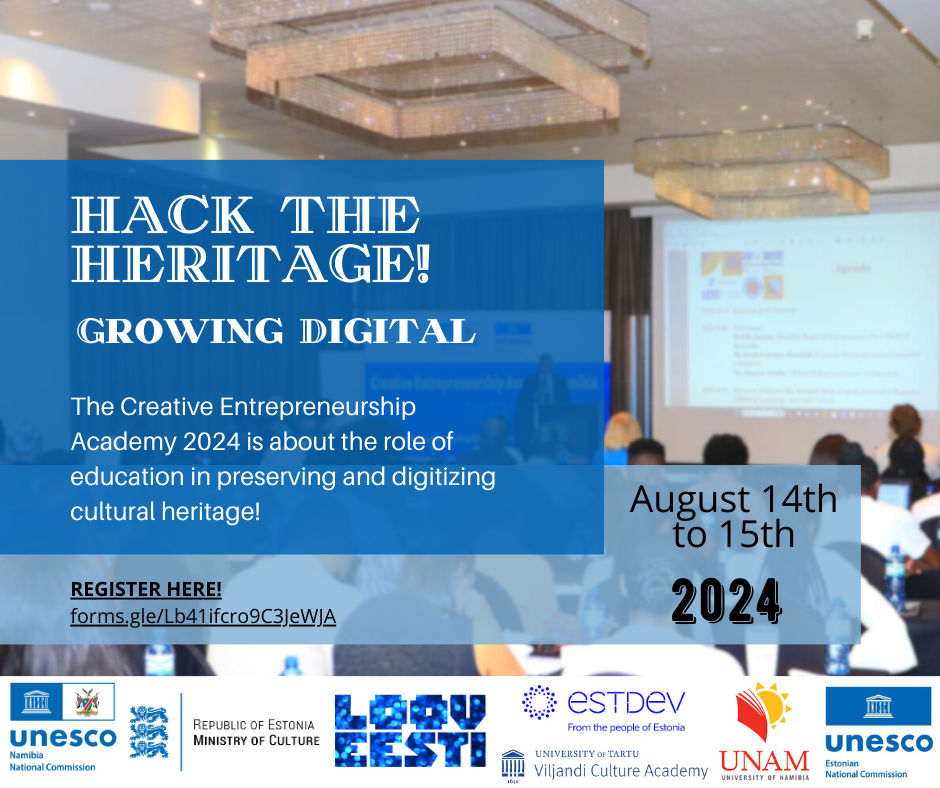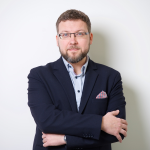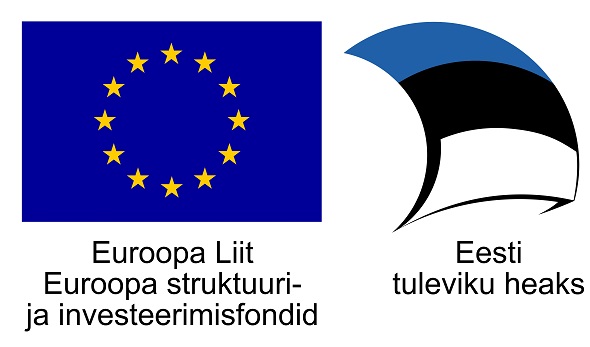Creative Entrepreneurship Academy: Hack the Heritage – Growing Digital
“The role of education in preserving and digitizing cultural heritage”
John Dewey: “Education is not preparation for life; education is life itself.”
The conference is part of the Creative Estonia and Namibia UNESCO – Natcom cooperation project funded by the Estonian Centre for International Development (ESTDEV) and implemented in collaboration with the University of Namibia and Viljandi Culture Academy, Estonia.
The goal is to motivate Namibian higher and vocational education institutions to incorporate digital skills and entrepreneurial capabilities rooted in cultural heritage into their curricula to enhance the educational experience.
Target group: Education Sector, Policymakers In Education, Entrepreneurs, Digital Community
Time: August 14- 15 2024
Venue: Arebbush Lodge Windhoek
AGENDA
DAY1
Masters of Ceremonies: Mr Shoki Kandjimi- Ministry of ICT, part I
Toomas Roolaid, moderator of the conference – part II
| Time | Heading | Speaker |
|---|---|---|
| 8:00-8:30 | Registration | |
| 8:30-8:35 | AU Anthems and National | |
| 8:35-8:45 | Cultural intervention | |
| 8:45-8:55 | Welcome Remarks | Mr. Gerard Vries, Deputy Executive Director Lifelong Learning, Arts and Culture and Commissioner Ministry of Education, Arts and Culture |
| 8:55-09:05 | Remarks | Mr Märt Volmer, Undersecretary of the Ministry of Culture, Estonia Welcome speech video. |
| 9:05-9:20. | Estonian-Namibian project overview | Ms Kersti Kilg, Creative Estonia Mr Toomas Roolaid, Business Coach and Management Consultant for Tacit Expert Knowledge and Know-How Management, Ms Madli Kumpas, Estonia National Commission for UNESCO |
| 9:20-9:30 | Remarks | Prof Kenneth Matengu – Vice Chancellor University of Namibia |
| 9:30-9:40 | Remarks | Ms Eunice Smith UNESCO Head of Office and Country Representative |
| 9:40-9:55 | Overview of what has been done in Namibia in teaching preserving the heritage | Dr Goodman Gwasira, UNAM |
| 9:55-10:25 | Digital transformation across the heritage sector: service architectures and new technologies. | Raivo Ruusalepp, Digital transformation consultant and manager, Senior Consulting Manager, Ernst & Young Baltics |
| 10:25-10:30 ………… | Cultural intervention | |
| 10:30-10:45 | Official opening | Hon. Itah Kandjii-Murangi, Minister of Higher Education, Technology and Innovation |
| 10:45-10:50 | Vote of Thanks | Mr Gernot Piepmeyer SG of the Namibia National Commission for UNESCO |
| 10:50-10_55 | AU Anthems and National | |
| 10:55-11:10 | TEA BREAK | |
| PART II | THE LANDSCAPE OF DIGITAL CULTURAL HERITAGE Sarah Kenderdine, Professor of Digital Museology: “Digital heritage is not just about preserving the past; it’s about leveraging technology to make our shared history accessible and engaging for everyone, ensuring that the stories and knowledge of diverse cultures are available for future generations.” MC Mr Toomas Roolaid | |
| 11:10-11:50 | PANEL DISCUSSION ‘’The role of education in preserving and digitizing cultural heritage’’ | Moderator: Mr Shoki Kandjimi, Ministry of ICT Mr Manfred Caeb Director of Culture: MoEAC (tbc) Ms Mkariko Amagulu Director of Arts: MoEAC Mr W Uutoni (UNAM: Head of Department Social Sciences) Ms Elica Ndalikokule, (director of Heritage) Mr Raivo Ruusalepp, Digital transformation consultant and manager |
| DEVELOPING HERITAGE-BASED DIGITAL SOLUTIONS IN CREATIVE ENTREPRENEURSHIP; INCLUDING WITHIN HIGHER EDUCATION Marshall McLuhan: “The medium is the message. Entrepreneurship plays an important role in digitising heritage – even small startups can lend a helping hand. Therefore, it is also necessary to teach entrepreneurship in the heritage sector. | ||
| 11:50-12:20 | How Viljandi Culture Academy uses digital solutions in teaching creative entrepreneurship. Estonian examples, of how the audience can use digital heritage: Museums, film, libraries | Mr Jorma Sarv, Viljandi Culture Academy |
| 12:20-12:35 | Actual Research gets the topics | Dr Masheke/ Dr Uutoni |
| 12:35-13:00 | How NUST uses digital solutions in the heritage sector | Dr Anna Matroos Gorases Executive Director: Directorate of Research Innovation Partnerships |
| 13:00-14:00 | LUNCH | |
| DIGITALIZATION OF HERITAGE AS A PREREQUISITE FOR USING DIGITIZED MATERIALS IN EDUCATION AND BUSINESS Peter Drucker: “The best way to predict the future is to create it.” If there is a sufficient amount of digitized heritage materials, it is possible to use them as examples and give students new assignments based on heritage preservation and contemporary use. | ||
| 14:00-14:40 | Digitized materials as a source and as a result of the example of the curricula of the Viljandi Culture Academy | Prof Ave Matsin, Viljandi Culture Academy |
| 14:40-15:10 | How the digitized materials are used in teaching cultural heritage in South Africa and Mauritius | Prof Rose Boswell, Executive Dean of Arts at Nelson Mandela Metropolitan University |
| 15:10-15:30 | Museums Association of Namibia (virtual museums and exhibitions; they have also worked with the Namibia National Museums of Namibia to digitize the anthropological Collection) | Ms Ndapewoshali Ashipala, Museums Association of Namibia |
| 15:30-15:45 | AR experience, showcasing Namibia’s rich cultural heritage. | Bosco Inyemba |
| 15.45-16:00 | Exploring Indigenous Entrepreneurship towards rural economic development: A case of Ovahimba | Brendan Rinouua Tjizu |
| 16:00-17:00 | PANEL DISCUSSION: How could teaching be improved to enhance digitalization in preserving heritage? | Lead: Toomas Roolaid Dr Boswell, Executive Dean of Arts at Nelson Mandela Metropolitan University Jorma Sarv, Viljandi Culture Academy Dr Rosa Johnson Dr Marius Johannes (Industry and Academia) Current Reality Dr Anna Matroos Gorases Executive Director: Directorate of Research Innovation Partnerships Ms Ingrid Mettler, Executive Director: International Training College-Lingua |
| 17:00-17:05 …………. | CONCLUSIONS OF THE DAY | MC Toomas Roolaid |
| 17:05- | AFTERNOON TEA AND NETWORKING |
DAY 2
| TIME ……… | Heading | Speaker |
|---|---|---|
| 8:30 | Registration | |
CONNECTIONS BETWEEN DIGITIZATION AND HERITAGE EDUCATION Seymour Paper: “The role of the teacher is to create the conditions for invention rather than provide ready-made knowledge.” Let´s discuss: How could Digitalization Transform Cultural Heritage Preservation and Teaching in Higher Education? ‘ MC- Mr Toomas Roolaid | ||
| Welcome to the World Cafe | NatCom and Estonia to do the welcome | |
| Opening Remarks | Prof A. Mosimane (Executive Dean Faculty of Education and Humanities) | |
| 9:30-10:00 ………… | WORLD CAFÉ, session 1 | |
| TABLE 1 Discussion: Discover the Secrets! How Can We Maximize the Effectiveness of Digital Solutions in Teaching | Dr Sadrag Shihomeka, UNAM | |
| TABLE 2 Unlock the Future of Education! How Can We Revolutionize Curriculum Development with Cutting-Edge Digital Solutions? | Ave Matsin, Viljandi Culture Academy | |
| TABLE 3 Preserve the Past, Shape the Future! How Can Digitalization Transform Cultural Heritage Preservation? | Raivo Ruusalepp Digital transformation consultant and manager | |
| TABLE 4 Ready to Become a Business Maverick? Discover How Innovative Teaching Methods Can Transform Entrepreneurship Education! | Jorma Sarv, Viljandi Culture Academy | |
| TABLE 5 The role of UNESCO in preserving heritage in education | MS Helvi Moshell, Ms Nehoa Kautondokwa and Mr Manfred /Gaeb, UNESCO | |
| TABLE 6 Discussion: Discover the Secrets! How Can We Maximize the Effectiveness of Digital Solutions in Adult education | Ms Kaereho, Charlene | |
| TABLE 7 Unlock the Future of Education! How Can We Revolutionize Curriculum Development with Cutting-Edge Digital Solutions? | Dr Kennedy Kariseb /Dr Goodman Gwasira, UNAM | |
| TABLE 8 Preserve the Past, Shape the Future! How Can Digitalization Transform Cultural Heritage Preservation? | Ms Ndapewoshali Ilunga, Museums Association of Namibia | |
| TABLE 9 Ready to Become a Business Maverick? Discover How Innovative Teaching Methods Can Transform Entrepreneurship Education! | Dr Marius Johannes, UNAM | |
| 10:00-10:30 ………… | TEA BREAK | |
| 10:30-11:00 | WORLD CAFE, session 2 | |
| TABLE 1 Discussion: Discover the Secrets! How Can We Maximize the Effectiveness of Digital Solutions in Teaching “How the International Training College uses Digital Solutions in teaching” | Dr Sadrag Shihomeka, UNAM | |
| TABLE 2 Unlock the Future of Education! How Can We Revolutionize Curriculum Development with Cutting-Edge Digital Solutions? | Ave Matsin, Viljandi Culture Academy | |
| TABLE 3 Preserve the Past, Shape the Future! How Can Digitalization Transform Cultural Heritage Preservation? | Raivo Ruusalepp, Digital transformation consultant and manager | |
| TABLE 4 Ready to Become a Business Maverick? Discover How Innovative Teaching Methods Can Transform Entrepreneurship Education! | Jorma Sarv, Viljandi Culture Academy | |
| TABLE 5 The role of UNESCO in preserving heritage in education | MS Helvi Moshell, Ms Nehoa Kautondokwa and Mr Manfred /Gaeb, UNESCO | |
| TABLE 7 Unlock the Future of Education! How Can We Revolutionize Curriculum Development with Cutting-Edge Digital Solutions? What has been done in Namibia in teaching and preserving digitalization and heritage in terms of public and procedural law? | Dr Uutoni/ Dr Charleen Kaereho, UNAM | |
| TABLE 7 Unlock the Future of Education! How Can We Revolutionize Curriculum Development with Cutting-Edge Digital Solutions? What has been done in Namibia in teaching and preserving digitalization and heritage in terms of public and procedural law. | Dr Kennedy Kariseb /Dr Goodman Gwasira, UNAM | |
| TABLE 8 Preserve the Past, Shape the Future! How Can Digitalization Transform Cultural Heritage Preservation? / How has the heritage council responded to digitalization of heritage | Ms Ndapewoshali Ilunga & Ms Elica Ndalikokule | |
| TABLE 9 Ready to Become a Business Maverick? Discover How Innovative Teaching Methods Can Transform Entrepreneurship Education! | Dr Marius Johannes | |
| 11:00-11:30 | Findings | Leads of the tables |
| 11:30-12:00 | Closure of the Conference | Mr Gernot Piepmeyer SG of the Namibia National Commission for UNESCO |
| 12:00-13:30 | LUNCH |
Meet the speakers
Raivo Ruusaleppis a director at the consultancy practice in EY Estonia. His work is focusing on e-government solutions, data and information management and digital culture topics. He has been helping heritage institutions with digital transformation strategies and projects for over 20 years. He has developed several national digital heritage strategies and masterminded service architectures for digitisation and archiving of digital heritage. He has fulfilled the role of Chief Digital Officer at the National Library of Estonia and has been a lecturer on digital information management and preservation at Tallinn University for 15 years. He is currently serving as a digital transformation expert for UNESCO advising the Ministry of Culture and Information Policy of Ukraine.
In 2007-2013 Jorma worked at the Estonian Ministry of Culture where he was responsible for strategic planning, creative industries policies and several development projects and studies. From 2013 to 2018 he worked at the State Chancellery as the head of the international programme dedicated to the centenary of Estonia. Jorma has been a member of various international committees and initiatives including the European Union expert group on cultural and creative sectors. As a strategy expert, he has 15 years of experience consulting various state institutions, civil society initiatives and other organizations. Since 2014 he has also been a member of the board and partner at consultancy group and thinktank Creativity Lab.
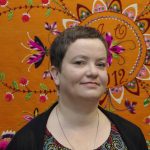 Ave Matsin works as a heritage textile lecturer and study program director at the University of Tartu Viljandi Culture Academy, where she has been developing a unique heritage craft curriculum system for decades. She is a member of the board of the Estonian Folk Art and Crafts Union, a member of the Estonian Intangible Cultural Heritage Council and has participated in many activities and projects that preserve and empower heritage culture both in Estonia and abroad. She is also the coordinator of the UNESCO Creative City Viljandi activities. In her activities, she focuses on the development of craft research methods, the valorization of local craft materials, and the study of historical textile techniques. She holds a master’s degree in Textile Art from the Estonian Academy of Arts
Ave Matsin works as a heritage textile lecturer and study program director at the University of Tartu Viljandi Culture Academy, where she has been developing a unique heritage craft curriculum system for decades. She is a member of the board of the Estonian Folk Art and Crafts Union, a member of the Estonian Intangible Cultural Heritage Council and has participated in many activities and projects that preserve and empower heritage culture both in Estonia and abroad. She is also the coordinator of the UNESCO Creative City Viljandi activities. In her activities, she focuses on the development of craft research methods, the valorization of local craft materials, and the study of historical textile techniques. She holds a master’s degree in Textile Art from the Estonian Academy of Arts
Toomas Roolaid is a business consultant focused on know-how and tacit expertise management for growing knowledge-based businesses and professionals keen on sharing their expertise. With 16+ years in process consulting, strategy facilitation, and guiding top performers in effective knowledge sharing, he also serves as a business coach for early-stage startups and advisor to mission-driven non-profits.
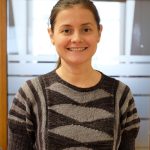 Madli Kumpas is a Coordinator of the UNESCO Education and Science Programme with a focus on International Cooperation for Development at the Estonian National Commission for UNESCO, Ministry of Culture. She has initiated interregional cooperation with the Eswatini and Namibia National Commissions and within UNESCO Associated Schools Network. Before taking up the position at the Estonian National Commission for UNESCO, Madli worked at Mondo – a leading global education and development cooperation NGO in Estonia. Madli has co-authored award-winning Estonian language and global education schoolbooks. She holds a master’s degree in Philosophy from the University of Tartu, Estonia.
Madli Kumpas is a Coordinator of the UNESCO Education and Science Programme with a focus on International Cooperation for Development at the Estonian National Commission for UNESCO, Ministry of Culture. She has initiated interregional cooperation with the Eswatini and Namibia National Commissions and within UNESCO Associated Schools Network. Before taking up the position at the Estonian National Commission for UNESCO, Madli worked at Mondo – a leading global education and development cooperation NGO in Estonia. Madli has co-authored award-winning Estonian language and global education schoolbooks. She holds a master’s degree in Philosophy from the University of Tartu, Estonia.
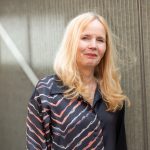
Kersti Kilg is a Chief Financial Officer and a project leader in the creative industries development centre Creative Estonia. She has been working on several international projects throughout almost all European countries and Israel, South Korea and Georgia.
Creative Estonia is committed to developing CCI start-ups and introducing the cross-sectorial impact of the creative industries. Creative Estonia´s mission is to take Estonian creativity to the world.
The Estonian Development Cooperation Fund funds the Conference.

